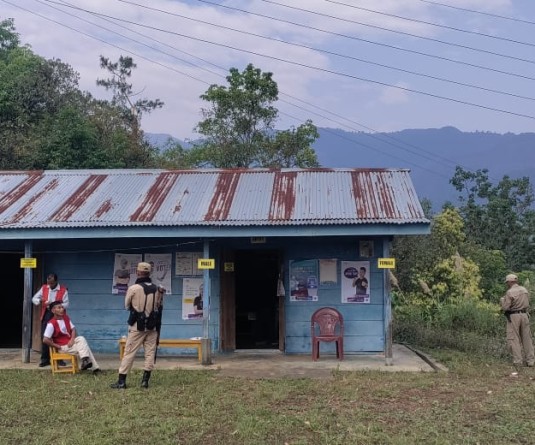
One of the receipts bearing the acronym F.N.R issued by the Government of the People’s Republic of Nagaland for entry into Zunheboto town.
DIMAPUR | October 11 : Truck owners in Nagaland are one of the most burdened as far as “underground tax” is concerned. Despite raising discontentment and going on strikes, truckers are still faced with the menace of taxation in every part of the State. In Zunehboto, men claiming to represent different Naga groups are collecting tax from trucks entering the town. Truckers say they are aware about the “one tax” rule enforced in Zunheboto by the Sumi Hoho but are afraid to raise any questions.
Copies of “challans” (‘receipts’) obtained by The Morung Express shows two groups- NNC and the GPRN- having issued four different kinds of challan to truckers for entry into Zunheboto. But there is confusion among truckers as to which groups are actually operating there. One NNC challan stating “The People’s Council of Nagaland” charges Rs.200 per entry into the town, while another group also claiming to be NNC issues a “handwritten” slip of paper and is charging Rs.200. The handwritten slip bears no name or seal and simply a phone number. The group has reportedly been telling truckers for quite some time that their “challan is being printed”.
The other two GPRN challans shows collection of Rs.300 each per truck entry. While one “gate pass” challan bears the official stamp of the “GPRN sumi region,” the other GPRN challan bears, strangely, along with the organization’s letterhead, the FNR acronym.
It is not understood as to why the “FNR” acronym has been printed on the challan but truckers are under the impression that FNR is also collecting tax. The FNR has refuted such claims.
FNR Convener, Dr. Wati Aier said categorically that “FNR does not collect tax.” He pointed out that in the past FNR had received information from civil society members that some organizations were collecting tax in the name of FNR. The FNR was told that the acronym actually stood for “Forest and Natural Resources,” a division run by the Naga groups. Aier requested people not think that FNR is collecting tax.
Many truck owners say they don’t want to send their trucks to interior districts but they have no option as it is the only way to keep their business rolling. Apart from much of the income being spent on maintenance of the truck due to bad road conditions, truck owners have been reeling under heavy losses due to tax collection.
Copies of “challans” (‘receipts’) obtained by The Morung Express shows two groups- NNC and the GPRN- having issued four different kinds of challan to truckers for entry into Zunheboto. But there is confusion among truckers as to which groups are actually operating there. One NNC challan stating “The People’s Council of Nagaland” charges Rs.200 per entry into the town, while another group also claiming to be NNC issues a “handwritten” slip of paper and is charging Rs.200. The handwritten slip bears no name or seal and simply a phone number. The group has reportedly been telling truckers for quite some time that their “challan is being printed”.
The other two GPRN challans shows collection of Rs.300 each per truck entry. While one “gate pass” challan bears the official stamp of the “GPRN sumi region,” the other GPRN challan bears, strangely, along with the organization’s letterhead, the FNR acronym.
It is not understood as to why the “FNR” acronym has been printed on the challan but truckers are under the impression that FNR is also collecting tax. The FNR has refuted such claims.
FNR Convener, Dr. Wati Aier said categorically that “FNR does not collect tax.” He pointed out that in the past FNR had received information from civil society members that some organizations were collecting tax in the name of FNR. The FNR was told that the acronym actually stood for “Forest and Natural Resources,” a division run by the Naga groups. Aier requested people not think that FNR is collecting tax.
Many truck owners say they don’t want to send their trucks to interior districts but they have no option as it is the only way to keep their business rolling. Apart from much of the income being spent on maintenance of the truck due to bad road conditions, truck owners have been reeling under heavy losses due to tax collection.




